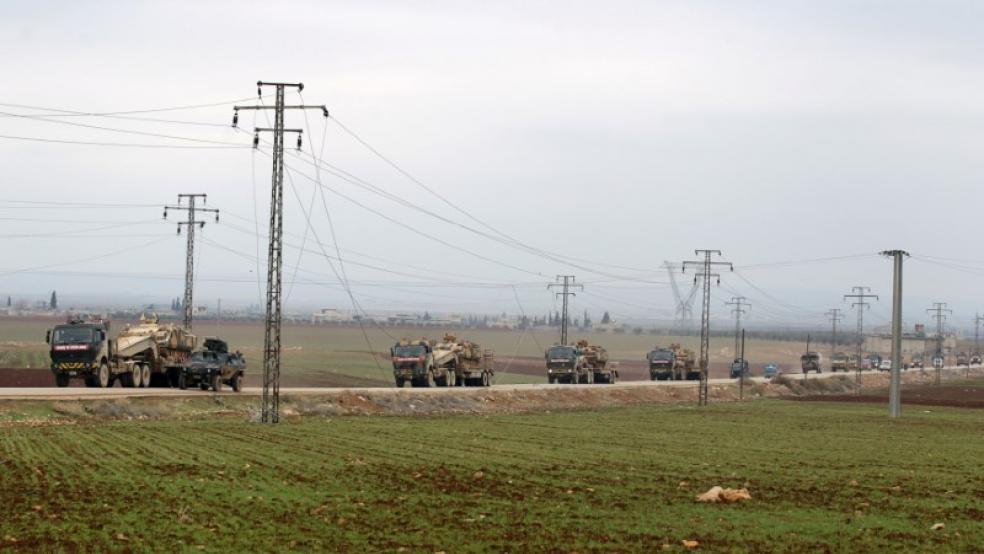ANKARA (Reuters) - Turkish forces swept into Syria overnight to rescue about 40 soldiers who had been surrounded for months by Islamic State militants while guarding the tomb of a revered Turkish figure.
The Syrian government described the operation as an act of "flagrant aggression" and said it would hold Ankara responsible for its repercussions.The action, which involved tanks, drones and reconnaissance planes as well as several hundred ground troops, was the first incursion by Turkish troops into Syria since the start of the civil war there nearly four years ago.The military said no clashes took place during the operation although one soldier had been killed in an accident.The 38 soldiers who had been guarding the tomb of Suleyman Shah, grandfather of the founder of the Ottoman Empire, were brought safely home. Normally, the detachment is rotated every six months but the last one was trapped for eight months by Islamic State fighters.The tomb, on a site within Syria that Ankara considers sovereign territory as agreed in a 1921 treaty, was to be relocated close to the Turkish border, while Suleyman Shah's remains were taken to Turkey."The remains of Suleyman Shah, along with ancestral relics, have been brought back to our country pending their temporary transfer to a new site in Syria," said Prime Minister Ahmet Davutoglu.He told a news conference that nearly 600 soldiers, including special forces commandos, took part in the mission. Turkey had not sought permission or assistance but had informed allies in the coalition against Islamic State once it began."This was an extremely successful operation with no loss to our rights under international law," Davutoglu said, flanked by the chief of the military and the defense minister.The Syrian government said in a statement that Turkey would be held responsible for its breach of the treaty after failing to wait for an agreement from Damascus before proceeding.The Turkish government had informed the Syrian consulate in Istanbul about the operation but had not awaited Syria's agreement, a violation of the 1921 accord, it said."There will be a letter from the foreign ministry to the relevant parties in the Security Council," Syrian Tourism Minister Bisher Yazagi told Reuters.A Turkish security source said the operation was conducted via the Syrian Kurdish border town of Kobani with the support of local Kurdish authorities. Kurdish forces, backed by U.S.-led air strikes, drove Islamic State from Kobani last month.HISTORIC SYMBOLTurkey has been reluctant to take an active role in the U.S.-led military campaign against Islamic State, partly because it wants to see the military action target Syrian government forces as much as the insurgents.But the Turkish government said late last year that Islamic State militants were advancing on the mausoleum, perched on the banks of the Euphrates river and made Turkish territory under the treaty signed with France in 1921, when France ruled Syria.Davutoglu had repeatedly said that Turkey would retaliate against any attack on the tomb, which was located 37 km (23 miles) from the Syrian border, but was to be relocated to Kurdish-controlled territory north of the village of Esmesi.Near the village, within sight of the Turkish border, two tanks and armored vehicles stood guard over mechanical diggers.Turkish soldiers raised the Turkish flag at the new site. "Countries which do not look after their historic symbols cannot build their future," he said on Sunday.The Syrian government statement said the fact that Islamic State had not attacked the tomb "confirmed the depth of the ties between the Turkish government and this terrorist organization".Syria accuses Turkey of supporting insurgent groups that have seized control of wide areas of northern and eastern Syria, including Islamic State.Islamic State and other Islamist groups, whose strict Salafi interpretation of Islam deems the veneration of tombs to be idolatrous, have destroyed several tombs and mosques in Syria.Suleyman Shah was the grandfather of Osman I who founded the Ottoman Empire in 1299. Traveling through modern-day Syria, he fell off his horse and drowned in the Euphrates near the site of the mausoleum, according to historians. Davutoglu said the tomb would be returned to its previous location once conditions allowed. He said the remaining buildings at the original site were destroyed to prevent their use after the remains were removed. (Additional reporting by Daren Butler, Ayla Jean Yackley and Humeyra Pamuk in Istanbul, Seyhmus Cakan in Esmesi, Tom Perry in Beirut; Writing by Nick Tattersall and Dasha Afanasieva; Editing by Rosalind Russell)Turkish military enters Syria to evacuate soldiers, relocate tomb

UMIT BEKTAS



